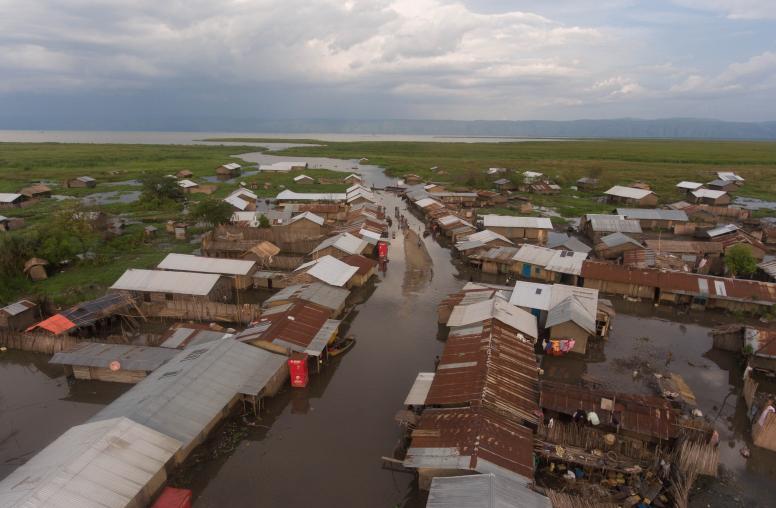Q&A: Uganda’s Troubled Election
On the Issues with Elizabeth Murray
Political polarization is high in the East African nation of Uganda, following the February 18 elections in which President Yoweri Museveni has claimed a victory that will extend his 30-year rule of the country. Elizabeth Murray, who oversees USIP’s programming and research in Uganda, discusses the tensions created by the elections, including the government’s repression, and arrests, of political opponents.

What is the controversy around the Ugandan elections?
During the lead-up to the elections, the Ugandan government, which is controlled by President Museveni’s party, the National Resistance Movement (NRM), systematically limited the ability of opposition candidates to campaign effectively. This included controlling candidates’ access to media coverage and intimidating journalists. Of equal concern is the government’s detention of opposition candidates and use of police force to break up their gatherings and rallies. President Museveni and the NRM have engaged in similar tactics around previous elections, so the repression in the lead-up to the 2016 elections did not come as a surprise to Ugandans or to the international community. As election day approached, Museveni also warned of consequences for anyone who would protest the outcome of the elections.
Election day unfolded peacefully at most of the country’s 28,010 polling stations, but several problems frustrated voters and rendered the elections inadequate by international election standards. Problems arose in Kampala, the capital, and in Wakiso, the district that surrounds the city, both of which are opposition strongholds. Voters had to wait in line several hours because the polling stations were not stocked with the necessary materials.
I spoke with Hassan Ndugwa. He is a fellow with Generation Change, which is USIP’s program for training youth leaders as peacebuilders. Hassan also is a senior program coordinator with Uganda Muslim Youth Development Forum. He voted in Wakiso, and reported that “a number of people in Kampala and Wakiso were disenfranchised as they became impatient with the late arrival of voting materials, especially women who were carrying babies in the hot sunshine among other family responsibilities.”
Another shortcoming in the electoral process, which has been highlighted by domestic and international election observers, is the lack of transparency around the tallying process. Prior to the election, Ugandans widely mistrusted the Electoral Commission, and these recent elections have further eroded public trust in the electoral process. A group of professors at Makerere University in Kampala observed that even Museveni’s supporters are now acknowledging the shortcomings of the electoral commission. The government dealt a further blow to political freedoms on the morning of election day by blocking access to social media, chat apps, and mobile money transfers. An estimated 1.5 million Ugandans sidestepped this restriction by downloading virtual private networks (VPNs) that allowed them to access the internet freely.
On February 20, the Electoral Commission announced that Museveni had won the election with 61 percent of the vote, followed by Kizza Besigye, Museveni’s longtime rival, with 34 percent. Besigye has thus far refused to concede the election, and has been arrested several times over the past week as he has tried to go to the Electoral Commission to demand a copy of the official results. Besigye’s near daily arrests—without a clear legal justification—have attracted criticism from Ugandans and the international community.
What is likely to happen next?
In conversations with USIP, youth activists reported “silent tension” and a “mood of tension and frustration” in parts of Uganda. Police and military are still deployed throughout the country. Some businesses shuttered in fear of being caught up in the violence, and many have yet to reopen. District elections were held in Uganda on February 24, but turnout was reported to be low.
Polarization between the ruling NRM and the opposition may be at an all-time high. Kizza Besigye is encouraging “defiance” among supporters of his party, the Forum for Democratic Change (FDC). Under Ugandan law, Besgiye has 10 days to formally challenge the results of the elections. FDC leaders report that the party is compiling evidence to file a formal challenge, but that they have been impeded by the Ugandan security forces. In particular, Besigye has been thus far unable to leave his house to demand a copy of the election results or file a formal complaint, because he is effectively under unlawful house arrest. If Besigye does succeed in marching to the Electoral Commission, it is likely that he will be joined by thousands of his supporters.
Besigye has demonstrated that he can bring Ugandans into the streets. In April 2011, his party organized the “Walk to Work” protests, which brought out thousands of people. Protests of any kind are likely to be met by violence on the part of the Ugandan police and military, whose violent crackdown on the 2011 protests resulted in several deaths.
As Museveni prepares to govern for another five years, he faces numerous challenges, including public frustration with corruption and massive unemployment among Uganda’s large youth population. Youth activists in Uganda have expressed concern that unemployed youth could be manipulated into violent extremism. Public services and infrastructure are also a priority for voters. Significant public resources were used to fund Museveni’s campaign, and Makerere University professors reported concerns that the huge expenditure of public funds over the past two years would lead to shortages in the coming years.
What should the international community do?
The international community should exert continued pressure on Museveni to cease the widespread repression in Uganda, including the intimidation of journalists and opposition parties, unlawful detention of candidates, and arbitrary restrictions on civil society activity.
Over the next several weeks, Museveni and the NRM should be encouraged to permit the FDC to file a formal complaint, as permitted by Ugandan law. It is also critically important that the international community exert this pressure even after the election period has concluded. Although repression has been widespread in Uganda during the election season, it is by no means unique to the election period. The Public Order Management Act of 2013 drastically limits freedom of assembly. The NGO Act, which has been passed by parliament and is expected to be signed into law by the president, is another legal tool that will limit the space for political dissent by imposing restrictions and heavy oversight on non-governmental organizations. Donor countries, which may have greater leverage, must continually express to the Government of Uganda that these laws are unacceptable.



